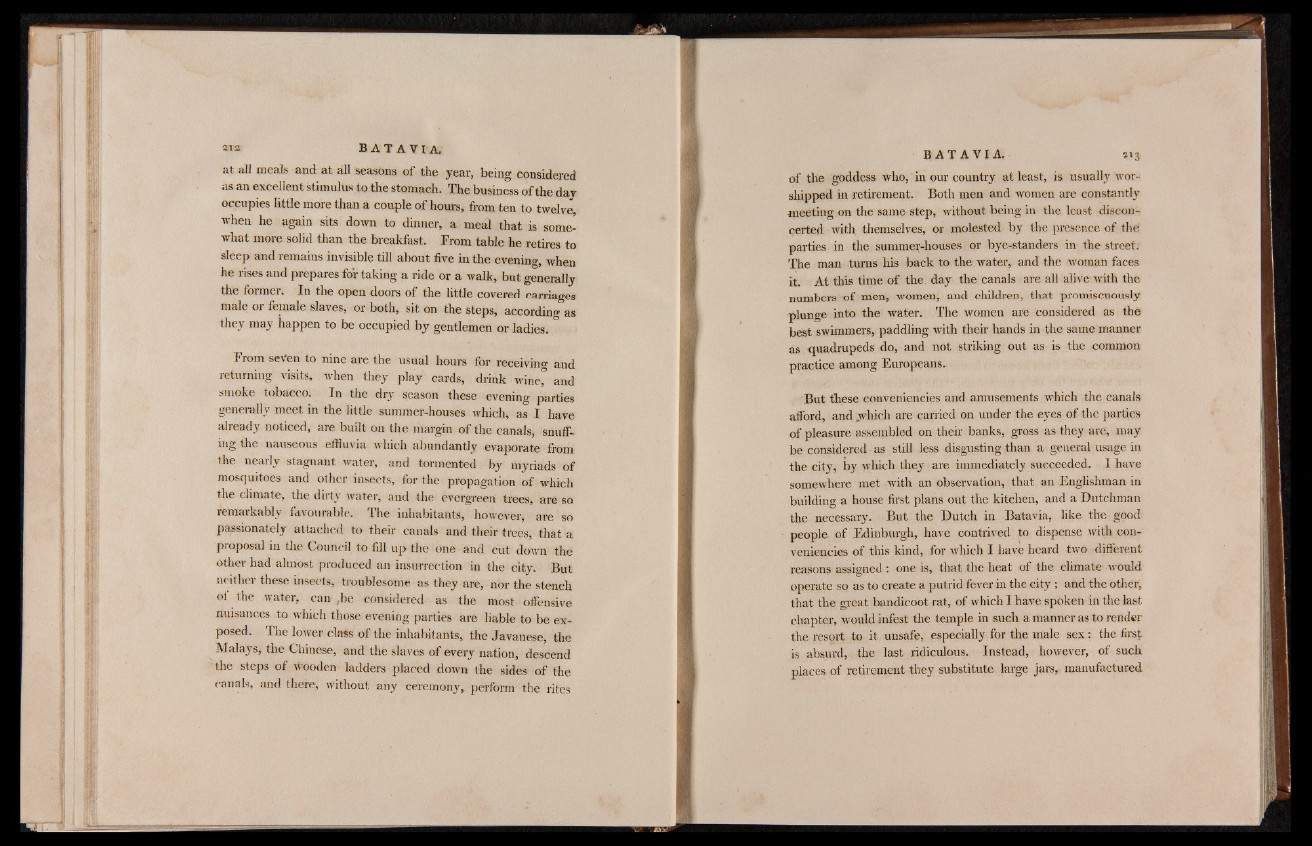
at all meals and at all seasons of the year, being considered
as an excellent stimulus to the stomach. The business of the day
occupies little more than a couple of hours, from ten to twelve,
when he again sits down to dinner, a meal that is somewhat
more solid than the breakfast. From table he retires to
sleep and remains invisible till about five in the evening, when
he rises and prepares for taking a ride or a walk, but generally
the former. In the open doors of the little covered carriages
male or female slaves, or both, sit on the steps, according as
they may happen to be occupied by gentlemen or ladies.
From seven to nine are the usual hours for receiving and
returning visits, when they play cards, drink wine, and
smoke tobacco. In the dry season these evening parties
generally meet in the little summer-houses which, as I have
already noticed, are built on the margin of the canals, snuffing
the nauseous effluvia which abundantly evaporate from
the nearly stagnant water, and tormented by myriads of
mosquitoes and other insects, for the propagation of which
the climate, the dirty water, and the evergreen trees, are so
remarkably favourable. The inhabitants, however, are so
passionately attached to their canals and their trees, that a
proposal in the Council to fill up the one and cut down the
other had almost produced an insurrection in the city. But
neither these insects, troublesome as they are, nor the stench
of the water, can ,be considered as the most offensive
nuisances to which those evening parties are liable to be exposed.
The lower class of the inhabitants, the Javanese, the
Malays, the Chinese, and the slaves of every nation, descend
the steps of wooden ladders placed down the sides of the
canals, and there, without any ceremony, perform the rites
BATAVIA. si j
of the goddess who, in our country at least, is usually worshipped
in retirement. Both men and women are constantly
meeting on the same step, without being in the least disconcerted
with themselves, or molested by the presence of the
parties in the summer-houses or bye-standers in the street.
The man turns his back to the water, and the woman faces
it. At this time of the day the canals are all alive with the
numbers of men, women, and children, that promiscuously
plunge into the water. The women are considered as the
best swimmers, paddling with their hands in the same manner
as quadrupeds do, and not striking out as is the common
practice among Europeans.
But these conveniencies and amusements which the canals
afford, and .which are carried on under the eyes of the parties
of pleasure assembled on their banks, gross as they are, may
be considered as still less disgusting than a general usage in
the city, by which they are immediately succeeded. I have
somewhere met with an observation, that an Englishman in
building a house first plans out the kitchen, and a Dutchman
the necessary. But the Dutch in Batavia, like the good
people of Edinburgh, have contrived to dispense with conveniencies
of this kind, for which I have heard two different
reasons assigned : one is, that the heat of the climate would
operate so as to create a putrid fever in the city ; and the other,
that the great bandicoot rat, of which I have spoken in the last
chapter, would infest the temple in such a manner as to render
the resort to it unsafe, especially for the male sex : the first
is absurd, the last ridiculous. Instead, however, of such
places of retirement they substitute large jars, manufactured